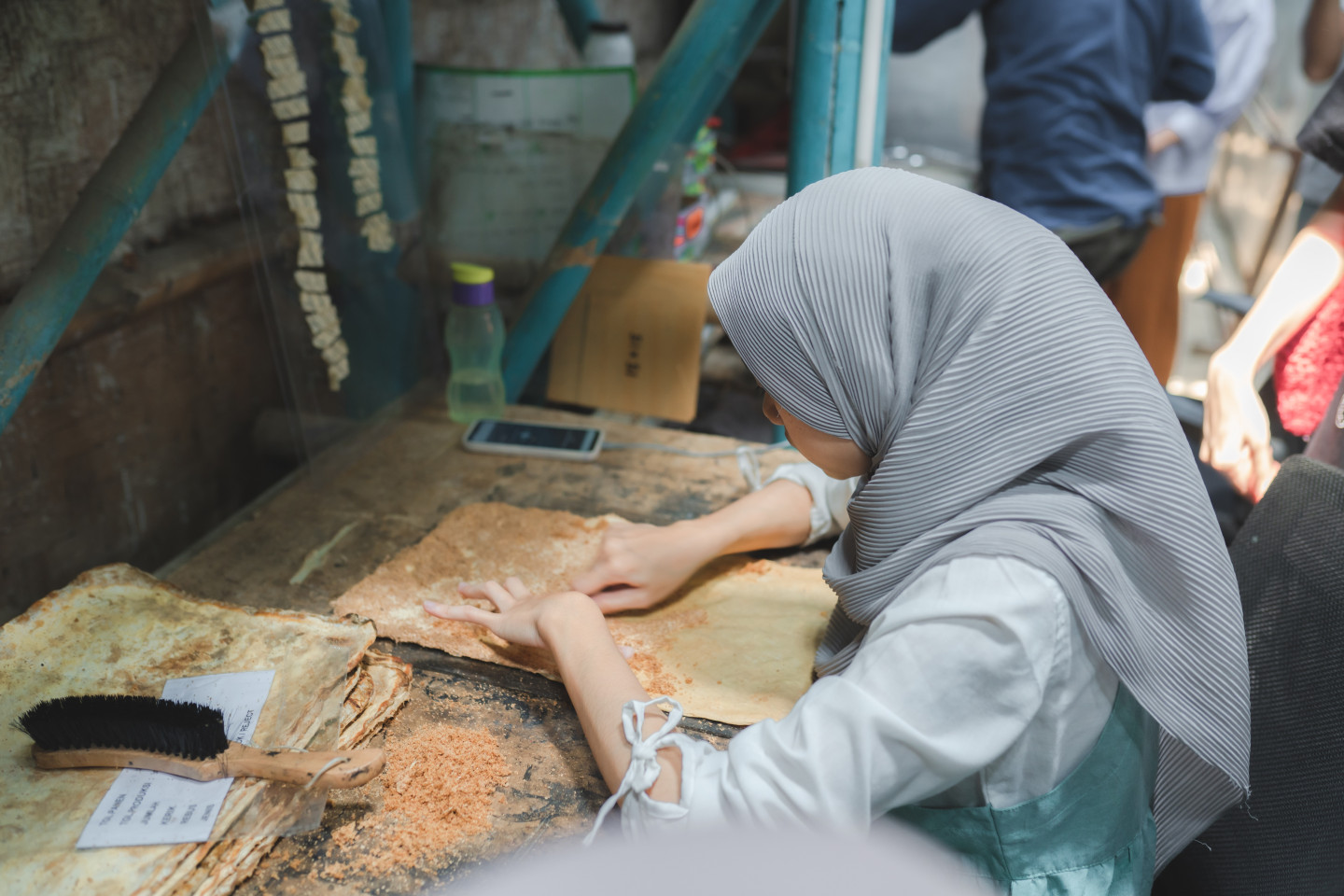Indonesia faces increasing environmental urgency, ranking among the top third of countries in climate risks. Coastal areas, housing 180 million people, confront flooding, extreme heat, and rising sea levels.
With the world’s 4th largest population, Indonesia generates significant waste, overwhelming landfills at 18.99 million tonnes annually. Unregulated waste disposal worsens pollution of waterways, soil, and air, posing threats to ecosystems, biodiversity, and human health.
Asia-Europe Foundation’s last Creative Responses to Sustainability Indonesia Guide highlights that the drive of artists working with environmental issues often starts with social where artists want to ‘connect heart to heart’ with the community. In 2020, the British Council investigated environmental challenges in Indonesia's fashion sector, mapping new and alternative materials in the craft industry. The study revealed a commitment among Indonesian artisans and designers to address environmental concerns through recyclability and upcycling, with a strong need of capacity building for Indonesian crafters in production, design, sustainable materials, and entrepreneurship, emphasising cross-sector research to develop eco-friendly materials.
Recognizing Design as a problem-solving tool, the Design Matters Lab project's sustainable focus aims to impact local communities positively, preserving industries and sparking conversations through arts to inspire long-term changes.
Revolutionising sustainable design to tackle environmental emergency in Indonesia
Design Matters Lab is a groundbreaking collaborative design initiative transcending geographical boundaries and cultural differences, uniting European and Indonesian creatives in a shared mission to revolutionise sustainable design. With Indonesia ranked among the top third of countries most vulnerable to climate risks and its waste generation reaching a staggering 18.99 million tons per year, urgent action is imperative.
Bringing together emerging design talents from Europe and Indonesia, Design Matters Lab fosters idea exchange, co-design, and co-delivery, leveraging design thinking and cultural collaboration. Through innovative utilisation of waste materials, the project aims to create eco-friendly products in craft, design, and fashion, benefiting local communities, and engaging policymakers in discussions about sustainability, addressing Indonesia's significant greenhouse gas emissions contribution.
The initiative begins with a 4-week online workshop and mentoring programme, facilitated by two European and two Indonesian design experts, followed by a two-week in-person residency camp in Bandung, West Java, Indonesia — a UNESCO Creative City of Design. The culmination includes presentations showcased at prominent events like Indonesian Contemporary Art & Design (ICAD), Bandung Design Week, and EU-Indonesia Climate Diplomacy Week, among others.
Overall, the Design Matters Lab project aims to not only create immediate impact within local communities but also contribute to a broader discourse on the importance of design in driving innovation and economic growth at regional, national, and European levels. Through strategic communication and collaboration, the project seeks to leave a lasting legacy beyond its initial lifespan, inspiring continued engagement and innovation in the field of design.
Alignment with UN Sustainable Development Goals
- SDG 12 - Responsible Consumption & Production: The project targets waste reduction & responsible consumption, repurposing materials into sustainable craft, design, and fashion products. Workshops/residencies educate designers on efficient resource use, waste management, and chemical impact mitigation, minimising adverse effects on the environment and human health. Public showcases amplify impact, encouraging others to adopt sustainable practices in their supply chains, fostering a global shift towards eco-conscious lifestyles.
- SDG 9 - Infrastructure, Industrialisation, and Innovation: Exploring alternative uses of waste contributes to sustainable industrial practices. Workshops/residencies enhance scientific knowledge and research, fostering innovation beyond traditional design. It promotes inclusive sustainable industrialisation, providing access and generating income to small-scale enterprises and artisans. Prototyping in Bandung encourages local production and eco-friendly supply chains. Public showcases exemplify circular economy principles, integrating it into design and manufacturing.
- SDG 13 - Climate Action: By exploring ways to reduce the environmental impact of traditional manufacturing. Focus on upcycling materials, minimising landfill waste and mitigating environmental consequences linked to production. This lowers overall carbon footprint and reduce extraction. Public showcases raise awareness and inspires design's pivotal role in mitigating climate challenges.

